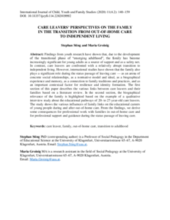Displaying 321 - 330 of 962
This report presents the outcomes of the implementation of the Cambodian Ministry of Social Affairs, Veterans and Youth Rehabilitation (MoSVY) Action Plan for Improving Child Care and the safe return of 30 per cent of children in residential care to their families, including key achievements, lessons learned, and recommendations going forward.
This Practice Note clarifies the legislative requirements in Scotland when undertaking a Welfare Assessment to support planning for a looked after young person to ‘stay put’ in a care placement under Continuing Care arrangements.
This paper is a condensed version of a study entitled “Beyond 18: Leaving Child Care Institutions - Supporting Youth Leaving Care: A Study of Aftercare Practices in Five States of India”, which found that upon turning 18, youth transitioning out of child care institutions to independent life in India experience many challenges, such as securing housing and identity documents; accessing education, skill development, and employment opportunities; and garnering psychosocial support.
This report presents the results of an evaluation of the Partnering for Family Success (PFS) program, which was conceived as an innovative intervention to address the particular needs of housing unstable families who had a child in the custody of the county child welfare agency.
The aim of this deinstitutionalisation (DI) model is to give guidance and a clear, practical approach for deinstitutionalisation for Residential Homes for Children (RHC) in Ghana.
Данное руководство предназначено для детей и молодежи, выходящих или вышедших из служб альтернативного ухода, и содержит информацию и советы, которые помогут им развить навыки, необходимые для жизни. Государственным учреждениям, некоммерческим организациям, а также всем, кто предоставляет поддержку молодым людям покидающим службы ухода, рекомендуется распечатать и распространить среди них данное руководство.
This chapter describes a youth-centered approach to transition planning for this vulnerable population and highlights essential elements to consider during the process such as disability, mental health, trauma, resilience, self-determination, culture, and how trauma impacts mental health.
The goal of this case study is to demonstrate a working model of family-based care in Zambia which can produce a replicable framework that can be modified for other regions and circumstances.
The first section of this paper describes the various links between care leavers and their families based on a literature review. In the second section, the biographical relevance of the family is highlighted based on the example of a qualitative interview study about the educational pathways of 20- to 27-year-old care leavers.
This report (in Khmer) presents the outcomes of the implementation of the Action Plan for improving child care with the target of safely returning 30 per cent of children in residential care to their families, including key achievements, lessons learned, and recommendations going forward.








